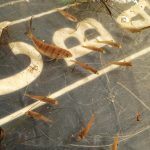Changes in the currents in the world’s oceans are known to have affected climate in the past, and are likely to affect climate in the future
Category: oceans
oceans
Swimming with Gratitude

Open water swimming in Bogue Sound has led to a more wholehearted appreciation for my coastal surroundings and community. When Hurricane Florence flushed debris and polluted waters into the sound this September, cutting our swim season short, it hurt to see the aftermath.
Recent study uncovers trends of coastal restoration research

A recent publication by Duke Marine Lab affiliates reveals trends in coastal habitat restoration research and suggests ways this research field can move forward towards effective conservation.
coasts, conservation, Duke Marine Lab, marine studies, oceans, St. Croix – 2018, students, travel
Christiansted Instead
After dinner, Jer brought his guitar out to the dinner table to play us a few songs. We passed the guitar around and revealed some hidden talent in the group. What started off as aContinue reading
conservation, Duke Marine Lab, marine studies, oceans, St. Croix – 2018, students, travel
Tide Pools and Turtles
Last night we were surprised to hear that we would be having the night patrol off, until roughly an hour later when a message came through saying a turtle had been spotted. I had hadContinue reading
Ode to a Leatherback
With a gust we are blown from Chart House, over yonder to the gathering at camp. Bug bites from last, with spray we must douse, by the faint red light of a headlamp. A ricketyContinue reading
Building an Oyster Reef in the Choctawhatchee Bay

After years of studying and writing about restoration, Erika Zambello (MEM’15) had a rewarding experience building an oyster reef with her own two hands.
Taking in the Touch Tanks

Over two Saturdays in October, Erika Zambello (MEM’15) was in charge of water touch tanks in back-to-back outdoor festivals. The experience was much more than she anticipated.
Give them a break! Spinner dolphin tours in Hawaii
Access to public resources is something that most Americans would likely agree is an important right. Enjoying and utilizing our natural environments, such as parks, beaches or waterways, is something everyone should be able toContinue reading
Dolphin Dilemmas
I find myself conflicted every time I’m presented with the opportunity to interact with marine mammals. The rational part of my brain says I should respect these intelligent creatures and keep my distance, but anotherContinue reading
